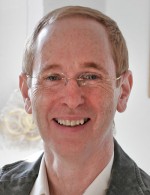Column Name
Title
San Francisco native Conrad Cummings composes opera, symphonic music, chamber music, and music for his ensemble of amplified instruments and voices. After receiving bachelor’s, master’s, and doctoral degrees—from Yale, SUNY-Stony Brook, and Columbia respectively—he did post-doctoral research at IRCAM in Paris and then served on the faculty of the Oberlin Conservatory, where he directed the music and media program. After several years running the interactive media company Hyperspace Cowgirls, Cummings joined the Juilliard Evening Division faculty in 2003. In September, UrbanArias in Arlington, Va., produced his 1989 opera "Photo-Op," a presidential campaign opera in which two singers—a soprano and a baritone—deliver, he says, “slightly surrealistic versions of stump speeches while they gradually, and unknowingly, reveal their most private thoughts.”
Body
Does Photo Op have a particular resonance this time of year generally—or for this election season in particular?
The opera had a wonderful three-week Off-Broadway run some years ago. But this time, to have a full production at the epicenter of political life in Washington, D.C., right after the national conventions and at the start of the most intense campaign period—that was really exciting. There’s a climactic aria and duet for which James Siena, the librettist, wrote these wonderful lines: “I believe in something, but I can’t remember what it is. I believe in something, but I’ve forgotten what it was.” Maybe every candidate, in the middle of an insanely grueling campaign, wakes up on one exhausted night thinking that.
When did you first know you wanted to be a musician and how did you come to know it?
I was walking by a tree I had walked by every day for five years in New Haven, having spent most of college wondering what I would be when I grew up—I was studying music and piano and composing like crazy, but still—and I looked up at the tree and thought, “You’re a composer, and you’ve been one for at least half a year already without realizing it.” That was a great moment. When I’m in New Haven I still say hello to the tree.
Who was the teacher or mentor who most inspired you when you were growing up and what did you learn from that person?
My stepfather, who was a dancer and choreographer, set me a daily example of what being an artist meant. Plus Stravinsky, Bartok, Stockhausen, and Boulez were always playing in his studio. At Yale and Stony Brook, Bülent Arel was my formative composition teacher. He said things like, “Your compositions are your children, you must love all of them even if they’re ugly,” and “Sometimes when you build a boat and launch it, it floats upside down, but it still floats.” And later Philip Glass (Diploma ’60, M.S. ’62, composition) was an important mentor, helping me to find my own path as a composer.
What was the first recording you remember hearing or buying?
We got a TV when I was 6 or 7, and that’s when I heard The Lone Ranger theme. I then got my mom to buy the complete Rossini William Tell Overture on four 78s, and I wore them out. Best of all was to open our bedroom window, turn the record player up, and listen to the storm music from the backyard. For some reason the neighbors didn’t complain.
What’s the most embarrassing moment you’ve had as a performer or in your career?
Composers joke that the only thing you can be nervous about by the time your piece is being premiered is whether you’ll fall over taking your bow. Running up onto the stage for the curtain call on opening night of my first opera, I slipped and took a flying fall into the conductor, coming very close to knocking him and the soprano into the pit. Now I’m more careful.
If you could have your students visit any place in the world, where would it be?
Paris, for a taste of how life should be lived, and maybe for a better appreciation of the openness of possibilities we have as musicians over here. Bali, for the total immersion in an incredibly rich musical culture that has nothing to do with ours.
What are your nonmusic interests or hobbies?
In the past few years I’ve gotten very serious about swimming. I work with a coach every week, and she pushes me mercilessly. To my surprise I can now do a respectable butterfly.
Do you follow any social media?
I like keeping up with friends and colleagues on Facebook.
What are you reading and listening to—and what can you tell us about them?
I’m on a Michael Chabon kick, reading everything I can get my hands on. Most recently, Summerland, in which a boy saves the universe by playing baseball. I just started his newest, Telegraph Avenue, about a used LP store in Berkeley. Perfect. And of course I’m listening to When Good Mangos Go Bad, a CD by my partner, singer/songwriter Bob Katz.
If you weren’t in the career you are in, what would you be doing?
I’d either be a construction supervisor or a physician. I love watching buildings going up, which demands a lot of patience from Bob when we’re out walking around the city. On the other hand, three of my closest friends are physicians, and I’m always asking about their work.
What would people be surprised to know about you?
That I love tap dancing and take tap classes regularly. I haven’t performed onstage yet, but you never know.





